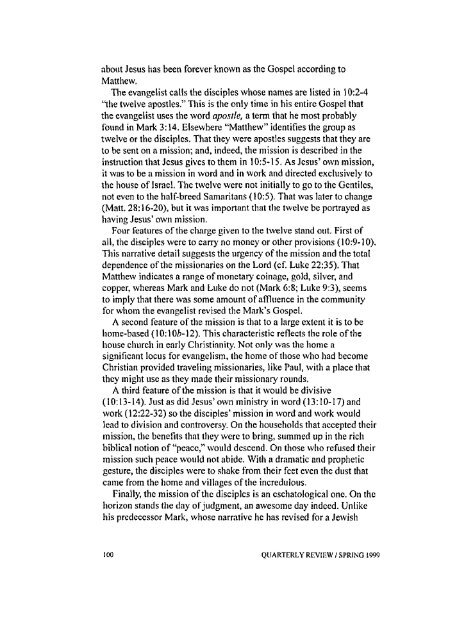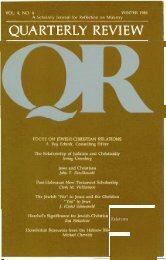Spring 1999 - Quarterly Review
Spring 1999 - Quarterly Review
Spring 1999 - Quarterly Review
Create successful ePaper yourself
Turn your PDF publications into a flip-book with our unique Google optimized e-Paper software.
about Jesus has been forever known as the Gospel according toMatthew.The evangelist calls the disciples whose names are listed in 10:2-4"the twelve apostles." This is the only time in his entire Gospel thatthe evangelist uses the word apostle, a term that he most probablyfound in Mark 3:14. Elsewhere "Matthew" identifies the group astwelve or the disciples. That they were apostles suggests that they areto be sent on a mission; and, indeed, the mission is described in theinstruction that Jesus gives to them in 10:5-15. As Jesus' own mission,it was to be a mission in word and in work and directed exclusively tothe house of Israel. The twelve were not initially to go to the Gentiles,not even to the half-breed Samaritans (10:5). That was later to change(Matt. 28:16-20), but it was important that the twelve be portrayed ashaving Jesus' own mission.Four features of the charge given to the twelve stand out. First ofall, the disciples were to carry no money or other provisions (10:9-10).This narrative detail suggests the urgency of the mission and the totaldependence of the missionaries on the Lord (cf. Luke 22:35). ThatMatthew indicates a range of monetary coinage, gold, silver, andcopper, whereas Mark and Luke do not (Mark 6:8; Luke 9:3), seemsto imply that there was some amount of affluence in the communityfor whom the evangelist revised the Mark's Gospel.A second feature of the mission is that to a large extent it is to behome-based (10:10^-12). This characteristic reflects the role of thehouse church in early Christianity. Not only was the home asignificant locus for evangelism, the home of those who had becomeChristian provided traveling missionaries, like Paul, with a place thatthey might use as they made their missionary rounds.A third feature of the mission is that it would be divisive(10:13-14). Just as did Jesus' own ministry in word (13:10-17) andwork (12:22-32) so the disciples' mission in word and work wouldlead to division and controversy. On the households that accepted theirmission, the benefits that they were to bring, summed up in the richbiblical notion of "peace," would descend. On those who refused theirmission such peace would not abide. With a dramatic and propheticgesture, the disciples were to shake from their feet even the dust thatcame from the home and villages of the incredulous.Finally, the mission of the disciples is an eschatological one. On thehorizon stands the day of judgment, an awesome day indeed. Unlikehis predecessor Mark, whose narrative he has revised for a Jewish100 QUARTERLY REVIEW / SPRING <strong>1999</strong>












